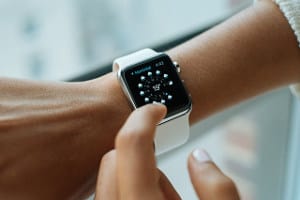We use “this”, “that”, “these” and “those” to specify which person or thing we are talking about.
We distinguish if the person(s) or thing(s) is near or far:
Near
“this” – singular
“these” – plural
Far
“that” – singular
“those” – plural
This, that, these and those can be used as:
1) Determiners with nouns (Example: This book is good.)
2) Demonstrative pronouns (Example: Drink that and go to bed.)
Let’s look at each use in more detail.
Determiners with nouns
We use “this”, “that”, “these” and “those” to specify which person(s) or thing(s) we are talking about. They are immediately before the noun they are referring to.
Examples:
Near and singular
(I am wearing a watch)

“I love this watch.”
Near and plural
(I am holding some shoes that I like.)

“These shoes are cute.”
Far and singular
(I am talking to a friend. The friend is wearing a dress. I point to it.)
“I love that dress.”
Far and plural
(I point at my friend’s trousers.)
“I love those trousers.” (trousers are always plural in English.)
Demonstrative pronouns
A pronoun replaces a noun. When we use “this”, “that”, “these” and “those” as demonstrative pronouns, they are representing a thing without actually specifically mentioning the thing. The thing is implied or understood so we do not need to write or say the noun.
Examples:
Near and singular
(Situation: While eating an ice-cream.)

“This is delicious.”
Near and plural
(Situation: asking someone to clean some boots. The speaker is holding the boots.)
“Could you clean these please.”
Far and singular
(Situation: While looking at a sunset.)
“That is beautiful.”
Far and plural
(Situation: Asking someone to carry some boxes upstairs. The boxes are far from the speaker.)
“Take those upstairs please”
Identifying and introducing people
We may use “this”, “that”, “these” and “those” as demonstrative pronouns to identify and/or introduce people.
Examples:
Near and singular
(Identifying oneself on the telephone.)

Jane: “Hi Sarah, this is Jane.”
Near and plural
(Introducing my parents to someone. My parents are standing next to me.)
“These are my parents.”
Far and singular
(Pointing at a man far away.)
“That looks like Mr Smith.”
Far and plural
(Pointing out my children to someone. My children are far from me.)
“Those are my children.”
Time is important
If an action is in the present or near future, then we use “this” (singular) or “these” (plural). It is because we consider that the action is near to us in time.
If an action is in the past, then we use “that” (singular) or “those” (plural). It is because we consider that the action is far from us in time.
Examples:
During the meal (near in time)
This is a lovely evening. (singular)

This pizza is delicious (singular)
These waiters are very friendly. (plural)
The next day – (far in time)
The next day, when we are talking about the meal from the previous evening, we use “that” and “those” because the event is relatively far from the present moment.
That was a lovely evening last night. (singular)
That pizza was delicious. (singular)
Those waiters were very friendly. (plural)
More English lessons
BY and UNTIL – Prepositions of time
The ING form of verbs – Spelling
Train travel – English vocabulary
Phrasal verbs with PUT
English video lesson
Here is a video lesson . There are over 150 English video lessons on my YouTube channel and I make new lessons every week so don’t forget to subscribe. 🙂


Mahasen says
Thanks for your explanations
Nazik says
I appreciate the simplified way for tghis concept
fatema begzad says
its very good website is i like it and i want learn grammer becase my problem is at sentenses and i can how use would to sentenses
Divya k J says
Very good explanation about the topic. Thanks